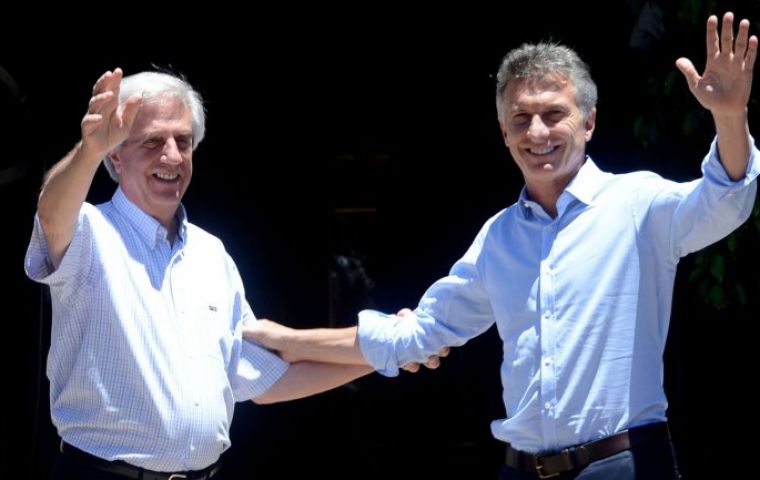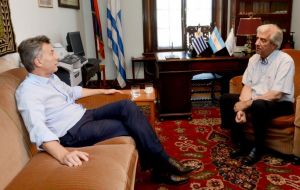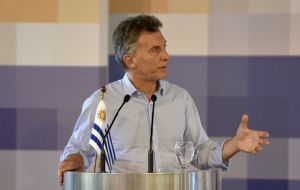MercoPress. South Atlantic News Agency
Macri and Vazquez marked the beginning of a new chapter in bilateral relations
 Vazquez thanked Macri for making Uruguay his first overseas country visit since taking office last 10 December.
Vazquez thanked Macri for making Uruguay his first overseas country visit since taking office last 10 December.  “It was a fruitful meeting with significant agreements for both countries. Uruguay has much to be thankful to Argentina”, said Vazquez
“It was a fruitful meeting with significant agreements for both countries. Uruguay has much to be thankful to Argentina”, said Vazquez  Macri announced the end to the ban on transshipment of Argentine exports through Uruguayan ports, “a most unfortunate decree”
Macri announced the end to the ban on transshipment of Argentine exports through Uruguayan ports, “a most unfortunate decree” Uruguay and Argentina presidents Tabare Vazquez and Mauricio Macri made on Thursday several announcements referred to bilateral issues indicating relations between the two neighboring countries have effectively improved following years of tension and misunderstandings with the governments of Nestor Kirchner and Cristina Fernandez.
Following the meeting at midday Thursday at Uruguay's presidential ranch in Colonia, where Macri arrived with several ministers and advisors, the two heads of states announced among other issues, the end to the ban for transshipment of Argentine exports in Uruguayan ports, the possibility of Argentina purchasing natural gas from the huge re-gasification plant being built in Montevideo, several environmental, navigation and ports agreements plus the decision to jointly bid to organize the 2030 World Cup, on the centenary of the first world soccer competition which was played in Uruguay.
Macri arrived at the Anchorena ranch by helicopter, a twenty minutes flight from Buenos Aires with his cabinet chief, Marcos Peña; foreign minister Susana Malcorra; speaker of the Lower House Emilio Monzó plus the advisor on foreign policy Fulvio Pompeo. Waiting was the recently nominated Argentine ambassador in Uruguay, Guillermo Montenego.
Following a brief private meeting between the two presidents, the delegations shared a barbecue, as Vazquez had promised Macri when his inauguration visit last 10 December. The host's delegation included foreign minister Rodolfo Nin Novoa, ambassador in Buenos Aires Hector Lescano, the Executive secretary, Miguel Angel Tomá and the head of policies at the foreign ministry, Martin Vidal.
In a brief contact with the media, with no questions taken (contrary to what was announced), Vazquez thanked Macri “for making Uruguay his first official overseas country visit since taking office”, and underlined he was not surprised at “the level of affection that the president has always expressed towards the Uruguayan people”.
“It was a most fruitful meeting, with significant accords for both countries. The most important I believe and I wish to reaffirm, is that the two governments have accepted that we must act at the same degree of friendship of our peoples. Uruguay has much to be thankful to Argentina”, indicated Vazquez.
The Uruguayan leader then enumerated some of the areas in which there were agreements, “environment for the joint monitoring of shared rives and spaces; mounting a state of the art lab which will also be available for other countries from Mercosur”.
“We have also advanced regarding the substantial power production Uruguay will develop with natural gas, re-gasifying liquid gas and which Argentina has anticipated would purchase, and which hopefully in a year's time should be in operational”, added Vazquez in reference to the huge gas terminal under construction a few miles west of Montevideo.
Vazquez also mentioned a task force to consider “a bi-national strategic plan to take advantage of our rivers and fluvial transport potential”.
Macri then announced he had derogated Resolution 1108/2013, a “most unfortunate decree”, which banned transshipment of Argentine merchandise in Uruguayan ports. “I've brought a copy, signed by Transport minister Guillermo Dietrich”.
The resolution banned exports originated in Argentine ports from being transshipped in Uruguayan ports. Even if countries were members of Mercosur, but they did not have specific maritime transport and freight accords with Argentina, the ban applied, as was the case with Uruguay.
The Argentine president added he was 'most pleased' to be in Uruguay because he has a very strong feeling towards the Uruguayan people and repeated what he had pledged along the electoral campaign which was “to rebuild the historic links between the two peoples united by history and with a common future to share”.
He then underlined the need to take advantage of the “Uruguayan infrastructure” in reference to the plant transforming liquid into natural gas and which can make inverse use of a gas pipeline linking the two countries. “The challenge is to complement ourselves with flexibility” and achieve “a River Plate with zero poverty”.
Finally Macri announced the joint bid with Uruguay to host the World Cup in 2030, on the centennial of the first such global competition which effectively was played and won by Uruguay. “Hopefully when that happens the leaders of the time will remember to invite these two very old folks to attend the opening ceremony”, said the Argentine president.
A few minutes after three in the afternoon the Argentine delegation left for Buenos Aires, but with the promise of “another meeting of this kind very soon”.
Although he idea was for the media to ask questions about the meeting, diplomatic sources said that “time urged” and both presidents had their own domestic problems which they did not want to distract from the purpose of the meeting. Vazquez is having a very hard time with his ally and rival former president Jose Mujica, who dominates congress and thus influences legislative initiatives, and Macri's administration has been unable so far to catch three fugitives from a high security prison who fled a week ago and continue on the run. They are three murderers life-sentenced and linked to the drug cartels.




Top Comments
Disclaimer & comment rules-

Read all commentsI'm not enjoying it! Cisplatin should be neutral.
Jan 08th, 2016 - 10:08 pm 0That was the deal than 200 years ago.
Commenting for this story is now closed.
If you have a Facebook account, become a fan and comment on our Facebook Page!